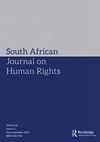Resuscitating the PAJA in state self-review? Compcare Wellness Medical Scheme v Registrar of Medical Schemes
IF 0.6
4区 社会学
Q3 LAW
引用次数: 0
Abstract
Abstract In the earlier decision in State Information Technology Agency SOC Ltd v Gijima Holdings (Pty) Ltd the Constitutional Court concluded that the legality principle and not the Promotion of Administrative Justice Act 3 of 2000 (the PAJA) applies to state self-reviews of administrative decisions. This was justified on the basis that the state, unlike a private litigant, is not a bearer of the right to administrative justice and is, for this reason, prevented from relying on the PAJA to review its own prior decisions (the Gijima principle). The Court, however, stated that its conclusion was limited to instances where a state organ reviews its own decision and acts in its own interest for the purposes of section 38(a) of the Constitution. This note explores the implications of the SCA’s later decision in Compcare Wellness Medical Scheme v Registrar of Medical Schemes for the Gijima principle. In substance, Compcare concluded that whenever a state organ seeks the review and setting aside of its own administrative action or that of another state organ, it must rely on the PAJA. This is because it will always be seeking to enforce the right to just administrative action in the public interest in terms of section 38(d) of the Constitution, and never in its own interests for the purposes of section 38(a). Although Compcare was concerned with a scenario that fell outside of the Gijima principle, the principled effect of the judgment is to resuscitate the PAJA in all state self-reviews of administrative actions and in so doing, to defeat the basic premise in Gijima that the state cannot rely on the PAJA.恢复PAJA状态自我审查?康普卡健康医疗计划诉医疗计划注册处
摘要在国家信息技术机构SOC有限公司诉Gijima控股(私人)有限公司的早期裁决中,宪法法院得出结论,合法性原则而不是2000年第3号《促进行政司法法》(PAJA)适用于国家对行政决定的自我意见。这是合理的,因为与私人诉讼不同,国家不是行政司法权的持有者,因此无法依赖PAJA审查其先前的决定(Gijima原则)。然而,法院指出,其结论仅限于国家机关为《宪法》第38(a)条的目的审查其自身决定并采取符合自身利益的行动的情况。本说明探讨了SCA后来在Compcare Wellness Medical Scheme诉Registrar of Medical Schemes一案中的决定对Gijima原则的影响。从实质上讲,Compcare得出结论,每当一个国家机关寻求审查和撤销其自身或另一个国家机构的行政行为时,它必须依赖PAJA。这是因为它将始终寻求根据《宪法》第38(d)条的规定,为了公众利益,而不是为了第38(a)条的目的,执行公正行政行动的权利。尽管Compcare关注的是吉岛原则之外的情况,但该判决的原则性效果是在所有州对行政行为的自我审查中恢复PAJA,并在这样做的过程中,打破吉岛州不能依赖PAJA的基本前提。
本文章由计算机程序翻译,如有差异,请以英文原文为准。
求助全文
约1分钟内获得全文
求助全文

 求助内容:
求助内容: 应助结果提醒方式:
应助结果提醒方式:


